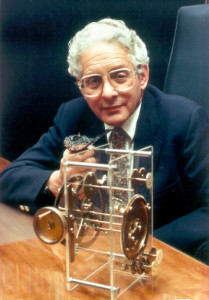The joy of bibliographies
 One of my graduate school professors, Derek J. de Solla Price (Little Science, Big Science), used to say that if you start with the references in the bibliography of one journal article, look up each of those references and follow their bibliographies to yet another set of articles, and so on – like the branches of a tree – you would eventually locate all the important publications in a given field.
One of my graduate school professors, Derek J. de Solla Price (Little Science, Big Science), used to say that if you start with the references in the bibliography of one journal article, look up each of those references and follow their bibliographies to yet another set of articles, and so on – like the branches of a tree – you would eventually locate all the important publications in a given field.
Bibliographies are often the first thing I read in a book. If an academic book has only footnotes and no bibliography, I’m disappointed. It’s so much easier to scan a bibliography for interesting titles than to ferret them out from wordy footnotes. An annotated bibliography is rare, but ideal.
On the Internet, Amazon has a feature called “Customers who viewed this item also viewed,” which is somewhat useful. Not that long ago Amazon used to have something much better: Titles that reference this book. It’s now gone, but you can accomplish the same thing these days using Google Books.
Mark Leary and the psychology of the self
It was a bibliography that recently started me reading about the psychology (as opposed to the history, philosophy, sociology or anthropology) of the self. A few months ago I saw a full page magazine ad by The Teaching Company for a lecture series called Understanding the Mysteries of Human Behavior. The DVD version was available in my local library and, since I had some free time, I ended up watching all 24 of the half-hour lectures.
My first reaction to the lecturer (Mark Leary) – once he started using evolution and neuroscience as explanations for behavior – was to adopt an attitude of oh-no-he’s-one-of-those (i.e., someone who prefers to ignore the influence of social and cultural contexts on human behavior). But the basic subject matter – how do we explain human behavior — was intrinsically interesting, and that kept me watching.
There was a booklet that came with the DVDs, and it had a bibliography. I discovered that Mark Leary had written a book called The Curse of the Self: Self-Awareness, Egotism, and the Quality of Human Life. Not only that. He was the founding editor of the journal Self and Identity and co-editor of Handbook of Self and Identity.
I read The Curse of the Self (pretty interesting), most of an earlier book of Leary’s called Self Presentation: Impression Management and Interpersonal Behavior (not quite as interesting), and several chapters in the Handbook, including one called “Cultural Models of the Self.” There I found references to the work of Hazel Rose Markus, co-author of highly cited papers, such as Culture and the self: Implications for cognition, emotion, and motivation (PDF). I had just been alerted to Markus as someone I wanted to read by an issue of New Scientist that did a cover story on the self.
One thing I hadn’t realized — and learned from Professor Leary — is that the subject of the self was more or less ignored by psychology in the years between the work of William James (late 19th century) and the 1970s. By now, of course, there’s plenty of reading material and an abundance of bibliographies.
I wish Derek Price had lived long enough to experience the ease with which one can follow bibliographic leads on the Internet. As someone who excelled in a quality psychologists call openness to experience, he really would have appreciated the World Wide Web.
Related posts:
Psychologists ask: What do we mean by “self”
Image source: MarkandVinny.com
References:
Derek J. de Solla Price, Little Science, Big Science
Mark Leary, The Curse of the Self: Self-Awareness, Egotism, and the Quality of Human Life
Mark Leary, Handbook of Self and Identity
Mark Leary, Self Presentation: Impression Management and Interpersonal Behavior
Hazel Rose Markus, Culture and the self: Implications for cognition, emotion, and motivation (PDF), Psychological Review, 1991, Vol 98, No 2, pp 224-253

Sorry, comments are closed for this post.